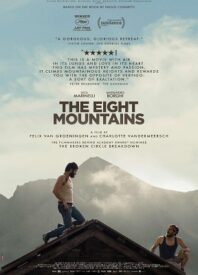
Pietro grows from a city child (Lupo Barbierio) to an angsty teen (Andra Palma). He takes his anger out on his parents (Elena Lietti and Filippo Timi) because their middle class meddling. They inadvertently separate him from his best friend Bruno (Francesco Palombelli). The adults decisions have reverberations that separate the teens in class, among other things. Because of this, Pietro spends considerable amount of time away from Turin. He only comes back as an adult (Martin Eden‘s Luca Marinelli) after his father dies. It may or may not be a surprisse that adult Bruno (Alessandro Borghi) is there for him. Strangely enough, they sublimate their mourning by building a house high up on the Alps. The Eight Mountains, then, becomes about what both men do to maintain their friendship and examines those tensions in two and a half hours.
The Eight Mountains is Charlotte Vandermeersch and Felix van Groeningen’s adaptation of Paolo Cognetti’s novel bearing the same title. As directors and screenwriters, their treatment of the material is comprehensive, letting viewers really know both Bruno and Pietro as characters. The casting here is also incredible, since Marinelli has a distinct look that seems difficult to duplicate and yet Palma captures an idea of a younger Marinelli. Borghi, however, is a discovery, expressing the emotions of a proletarian who realizes that he’s the product of generational trauma. Bruno, for exmaple, tells Pietro about picking up the pieces that his family left him. Sadly, he doesn’t know that getting out of it is a possibility. Borghi has been working in Italian cinema for a decade now and this is a good way for international viewers to see his abilities. He’s specifically good at delivering dialogue both in Italian and Piedmontese.
Bruno, thankfully, isn’t the only one able to reflect on his family. Being quasi-mirror images of each other, Pietro also makes his own discoveries, seeing a better side of his presumably disgtant father. Both Vandersmeersch and van Groeningen pack all this human drama and make it accessible to regular viewers. They also put enough deep cuts in the soundtrack to make those emotional cues work. They also wisely choose to use a fullscreen ratio instead of going wide, the latter being the obvious choice while depicting mountains, but there’s an obvious intimacy with the fullscreen ratio. There’s also something haunting about both the imagery and the performances here. I wrote enough good thingd about Borghi here, but Marinelli is just as reliable. He doesn’t let Pietro’s scars show but he reveals them, matching The Eight Mountains‘ subtlety.
Cinephiles in Ottawa and Toronto can watch The Eight Mountains in select theatres.
- Rated: NR
- Genre: Drama
- Release Date: 5/19/2023
- Directed by: Charlotte Vandermeersch, Felix van Groeningen
- Starring: Alessandro Borghi, Andrea Palma, Elena Lietti, Filippo Timi, Francesco Palombelli, Luca Marinelli, Lupo Barbiero
- Produced by: Gianluca Mizzi, Hans Everaert, Lorenzo Gangarossa, Lorenzo Mieli, Mario Gianani
- Written by: Charlotte Vandermeersch, Felix van Groeningen
- Studio: Menuet, Pyramide Productions, Vision Distribution, Vlaams Audiovisueel Fonds, Wildside Film Commission Regione Valle d'Aosta

